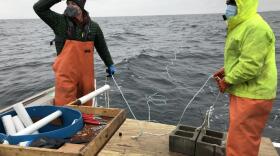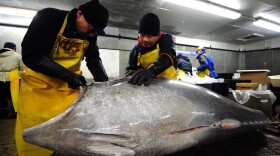Fred Bever
A Columbia University graduate, Fred began his journalism career as a print reporter in Vermont, then came to Maine Public in 2001 as its political reporter, as well as serving as a host for a variety of Maine Public Radio and Maine Public Television programs. Fred later went on to become news director for New England Public Radio in Western Massachusetts and worked as a freelancer for National Public Radio and a number of regional public radio stations, including WBUR in Boston and NHPR in New Hampshire.
Fred formerly was Maine Public Radio’s chief political correspondent from 2001 to 2007 and returned to Maine Public Radio in early 2016 as a news reporter and producer, covering a wide variety of topics across Maine and the region.
-
A federal investigation of allegations that China is illegally avoiding duties on solar panels sold to U.S. companies is putting the brakes on the nation's solar power build-out.
-
A lot of Americans learned to shuck oysters and cook fish at home during the pandemic. Now that restaurants are getting back to normal, there's a supply crunch.
-
A Maine startup is drawing high-profile support for its low-tech plan to soak up carbon emissions. It says its kelp farms will sink to the ocean floor and lock the carbon away for millennia.
-
Maine's economy relies heavily on summer tourism. With Memorial Day around the corner, many business owners are figuring out when and whether they'll be allowed to reopen.
-
No matter where in the globe former President Bush's pursuits took him, he circled back every year, as if tethered, to Walker's Point — his family's estate in Kennebunkport, Maine.
-
Maine's coastal waters are warming quickly. Lobster may not be abundant forever so fishermen are finding new ways to make a living on the water.
-
Most catches are exported to unagi-loving Asian nations, which pay up to thousands of dollars per pound. But one woman is raising and marketing eels for U.S. buyers: "Why not keep that value at home?"
-
Scientists says to help whales, the ropes used to tend lobster traps must be changed or eliminated. Mainers who catch lobster for a living feel they're being singled out for an international problem.
-
After decades with no sign of a lethal neurotoxin, the algae that produces it is now plaguing the warming waters of the Gulf of Maine, forcing unprecedented closures in shellfish harvesting.
-
New England fishers say it's been decades since they've hauled in so many tuna, and some in the industry are urging higher quotas. But some environmental groups fear the population is still imperiled.









